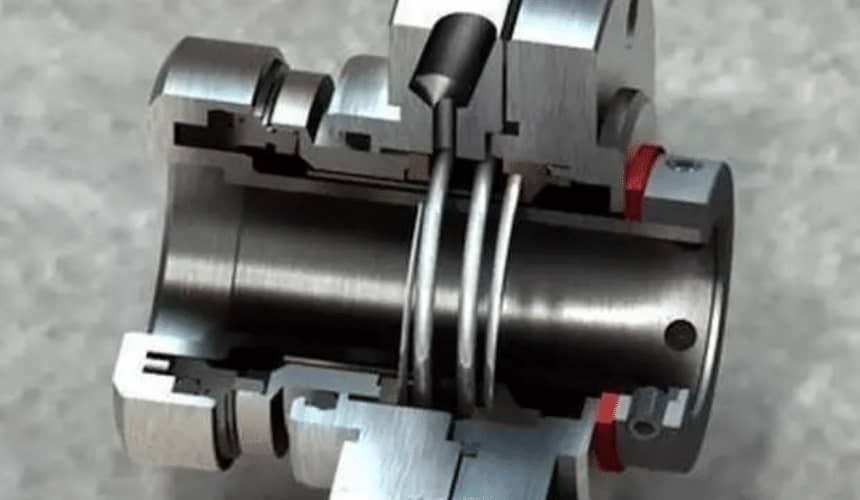Mechanical Seal – an overview
A mechanical seal plays an important role in the function and operation of a centrifugal pump. There is a spinning shaft accommodated by a pump where the gas or fluid is mechanically maintained at the “wet end” of the pump.
In a mechanical seal, there is a rotary seal face with a driving mechanism. It rotates at the same speed as the pump shaft. The stationary part of the seal is retained with the help of a gland. In some models, there is an integral stuffing box cover.
To keep the rotary face firmly positioned against the stationary face, a tension assembly is used. The seal contains contamination and prevents leakage when the pump is operational or not.
The other part that completes the seal assembly is the static sealing gasket or ring or elastomeric bellows. They are strategically located in the seal.
Mechanical seals are leakage control devices, which are found on rotating equipment such as pumps and mixers to prevent the leakage of liquids and gases from escaping into the environment.
Mechanical Seal in a Centrifugal Pump – The mechanical seal is used in a pump, mixer, and other mechanical engineering scenarios to contain the fluid within a vessel where a shaft rotates through a stationary (or rotating) housing.
The working mechanism of a mechanical seal
The two faces of the seal play the main role in its mechanism. As mentioned earlier, the two faces are rotating faces and stationary faces. These faces are lapped so flat that there is no chance of gas or liquid passing through them.
Due to that, the shaft can spin freely, and the seal is maintained mechanically. The life of the seal depends on the seal material combination. For abrasive material, hard seal faces are used. For water or automotive application, carbon or ceramic seals are useful. Silicon carbide seals are long-lasting, and they are energy efficient.
Double mechanical seals are normally used in critical applications.
Prevention of leaking
The path within a mechanical seal is blocked with the help of a gasket, o-ring, or wedge made of rubber, flexible graphite, or PTFE. Maintenance of the seal is a critical aspect.
Single or multiple springs or metal bellows or compressed elastomers are used for maintaining the seal faces together. The design of the mechanical seal determines the load on its face.
Seals must be designed to cater to the evolving industry demand. The fundamental rotating face of the seal design is capable of adapting to a wide range of industrial applications. Standard mechanical seals can work in very high-temperature conditions and shaft rotation speeds. The choice of a secondary seal determines the chemical capabilities and temperature of the seal. The chemical and abrasive resistance of the seal is defined by the combination of material used in the stationary and rotating faces of the mechanical seal.
Beston Seals is ISO certified company specializing in providing solutions to all types of leakages by manufacturing mechanical seals and sealing components as per customers’ drawings, samples, or requirements. We are one of the best rotary union and mechanical seal manufacturers in India based in Mumbai, Maharashtra. To know more about mechanical seals call on +91-9820007401 or email info@bestonseals.com.

